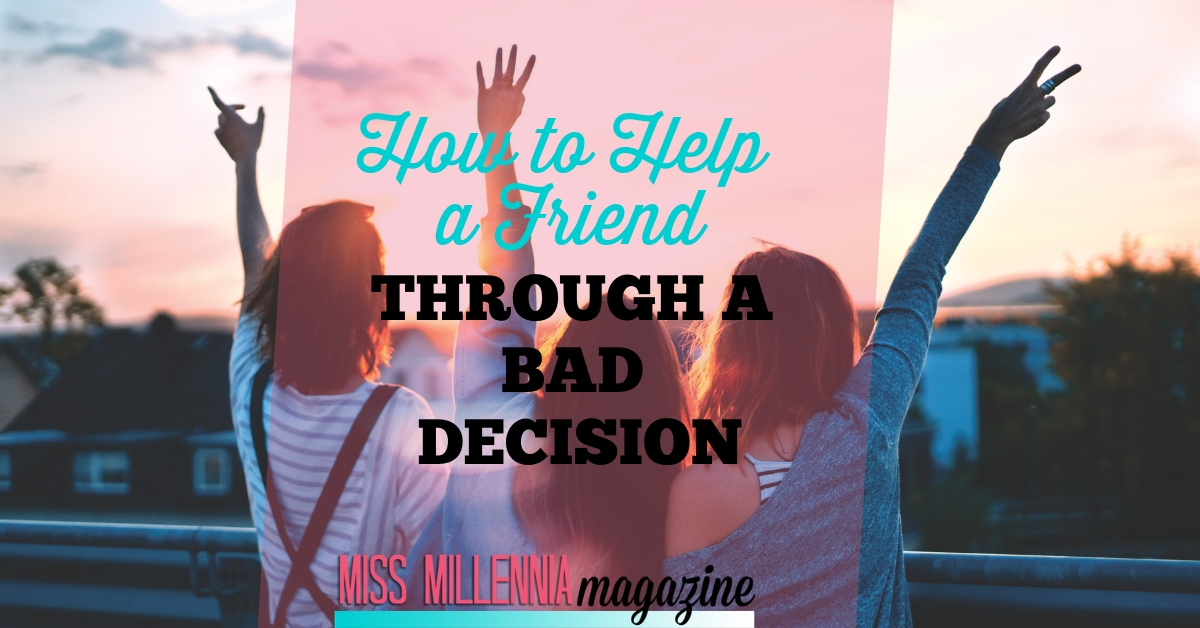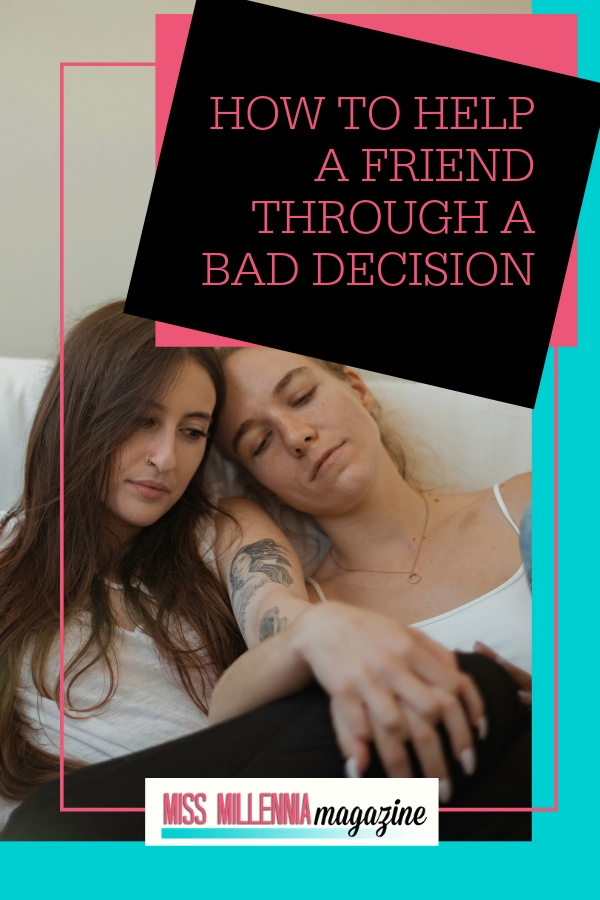How to Help a Friend Through a Bad Decision

Helping a friend navigate the fallout from a poor decision or guiding them as they contemplate a potentially harmful choice can be challenging. I’ve been both the advisor and the advisee, the on-call therapist and the one climbing into my roommate’s bed in tears, asking if I could sleep there for the night.
One of the most challenging parts of such a situation is the desire to fix the problem at hand. Watch the video below as well for more insight as well.
Watching the destructive behaviors of or towards someone you love can be frustrating. Although your plan of action might be close on hand, you might need to reevaluate your degree of involvement. At the same time, you’re not about to let your best friend walk down the aisle with the boyfriend who cheated on her twelve different times that month.
Let’s break this down. Read on to learn more about how to help a friend through a bad decision.
Understanding What “Bad” Really Means
We all make our share of painful decisions; some are more impactful than others. Be sure to evaluate the situation objectively, asking yourself why executing the problem would be detrimental. From an ethical standpoint, “bad” might mean morally wrong.
Yet, we each have our own unique moral code that allows us to evaluate pros and cons and ultimately reach conclusions that are closest to each of our personal values. Before raising your voice, consider who this decision is hurting. Is your friend happy or unhappy in her current state? Are you more concerned about what you would do?
Questions to Consider:
- Is the decision causing harm to my friend or others?
- Could it impact their mental, physical, or emotional well-being?
- Am I projecting my own feelings onto the situation?
However, actions that harm someone’s physical health require immediate action. Be sure to call 911 if your friend is considering physical harm to themself or others.
Withhold (Visible) Judgment
Criticizing a friend’s choices can seriously damage your relationship if you aren’t careful about expressing that criticism. Be conscious of your demeanor and severity while discussing the problem.
Something as small as a wrinkled nose can give away your disgust and downgrade your credibility from “objective listener” to “opponent.” Not allowing your friend to explain her side might start a fight immediately rather than leading to a solution.
Tips to Avoid Visible Judgment
- Maintain a neutral, calm demeanor when discussing the issue.
- Resist the urge to use strong language or react negatively.
- Let your friend share their perspective without interruptions or visible reactions.
This approach might seem counterintuitive since you probably feel that you need to stop something unhealthy before it starts (or continues to worsen). However, there are (forthcoming) methods of discussion and conversation that don’t include making your friend feel isolated.
You Don’t Have to Agree to Be Supportive
A common misconception about being a “good friend” is that you must be brutal, unforgivingly honest, or blindly agree. Social relationships, especially the close and important ones, require a certain amount of tact and honesty.
Just because you aren’t actively vomiting at the mention of your friend’s terrible boyfriend doesn’t mean you can’t calmly express the reasons why he appears to be an opposing force. You’re allowed to have an opinion in times that require honesty for the well-being of a loved one.
It might even be helpful to phrase it as a question. Let me give you an example (entirely fictional) conversation:
Sarah
I noticed Jared was yelling a lot about the wedding plans.
Leah
Yeah, he raises his voice when he’s frustrated.
Sarah
Got it. Does it upset you when he acts that way?
As a result, a number of things can happen. You might get information, you might get nothing, or you might just have to move on with the conversation.
Result #1: Acknowledgment
Leah
It does upset me. It makes me uncomfortable.
This might be the best-case scenario, in which Leah is honest with herself, and you merely facilitated that self-examination.
Result #2: Resistance
Leah
No, we’re just like that. And it’s not your business.
Maybe she’s defensive because she knows she’s hurting, or perhaps she and Fired-Up McGee over there do fight hard/love hard. Someone taking notice may still spark her attention, and she’ll think about what you said before she goes to sleep.
Result #3: No Change
Leah
I don’t know; I haven’t thought about it.
Gauge the situation. Does it feel like you should keep prying? Is it time to pull back? Use your judgment to determine whether bringing this problem into the foreground right away is appropriate.
Encourage, Don’t Discourage
While you might not be able to dissuade your friend from spending time with harmful people, you can encourage her to participate in “positive experiences with yourself and other people from time to time” (Psychology Today).
You can’t pry Leah from her loud, anger-prone boyfriend, but you can set up additional time for fun, exciting activities that remind her of the wonderful friends she has outside of her relationship.
Perhaps the positivity might allow her to realize that she doesn’t need her boyfriend to fill any holes or that she can indeed have a fulfilling social life with close friends—ones that don’t yell about every little thing.
Ways to Encourage Positive Experiences:
- Plan activities together, such as hiking, visiting a new café, or taking a class.
- Invite them to participate in events that bring joy and allow them to relax.
- Remind them of what makes them special and valued outside of any challenging situations they may be facing.
Remember: Autonomy
With some help in this scenario, Leah might realize that she doesn’t want to marry this creep, but alternatively, he might not be a creep. Your opinions, past experiences, and associations color everything you think and do, even as you might be ultra-impartial.
Ultimately, your friend may have to make her own mistakes or use all the support and information you’ve given her to make an informed decision. She knows what’s best for her, after all.
Note that health-related or legal matters may be more severe and require immediate intervention. The National Suicide Prevention hotline is 1 (800) 273-8255, and as always, call 911 in the event of an emergency.
Create a Safe Space for Open Conversation
When supporting a friend, creating a safe and open space for conversation is essential. Let them know that they can share openly without the fear of being judged or pressured into a decision.
Ways to Create a Safe Space:
- Actively listen to understand, not just to respond.
- Ask open-ended questions to encourage your friend to think deeper.
- Avoid pushing for answers or solutions during these conversations; sometimes, just listening can be enough.
This approach helps maintain a positive environment where your friend feels respected and understood, even when unsure of the right course of action.
Frequently Asked Questions
What should I do if my friend is repeatedly making poor decisions?
While it’s tough to watch, remember that they need to reach decisions on their own. You can gently suggest they consider therapy or counseling, which can offer them the support they need.
How can I support my friend without getting frustrated?
Recognize that their journey may be different from what you’d choose, and try to separate their decisions from your own feelings. Patience, empathy, and self-care are all crucial when helping someone else.
What if my friend’s actions start impacting my mental health?
It’s okay to set boundaries. Let your friend know you’re there for them but need to care for yourself too. Healthy boundaries can protect both your well-being and your friendship.
How do I avoid being judgmental?
Avoid offering advice unless asked and focus on active listening. Body language and word choice also play a big role in keeping conversations judgment-free.
Is it okay to step back if I feel like I can’t help?
Yes, stepping back can sometimes be the most supportive thing you can do. Letting them know you trust their judgment respects their autonomy and might make them more likely to seek your advice when they’re ready.
Conclusion: Being a True Friend Through Tough Times
Being a good friend is less about stopping “bad decisions” and more about guiding a friend toward optimal mental health. Your support and guidance will hopefully lead to a natural digression from damaging influences.
Supporting a friend through hard choices is about balance—guiding without controlling, caring without judging, and offering help without expectation.
So the question remains: How to help a friend through a bad decision? By respecting their journey and offering encouragement rather than criticism, you can help them build confidence in their decisions and find the clarity they need. A true friend empowers others to grow and learn, even if that path involves mistakes.
How have you helped a friend through a potentially harmful decision? Tell us about it in the comments!
